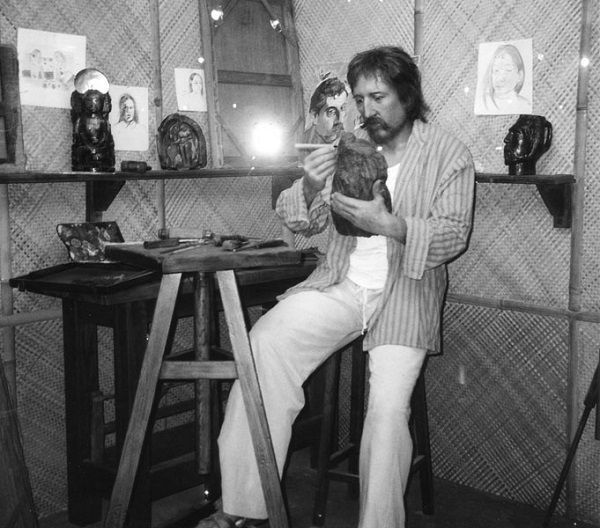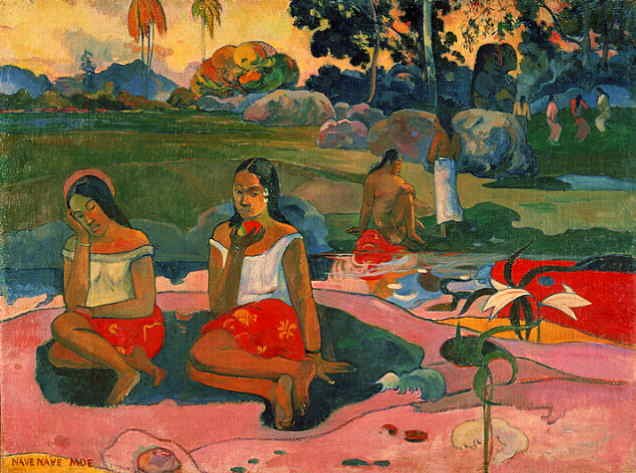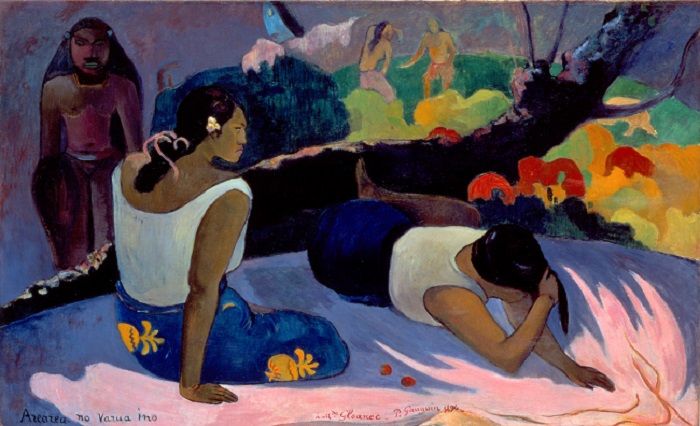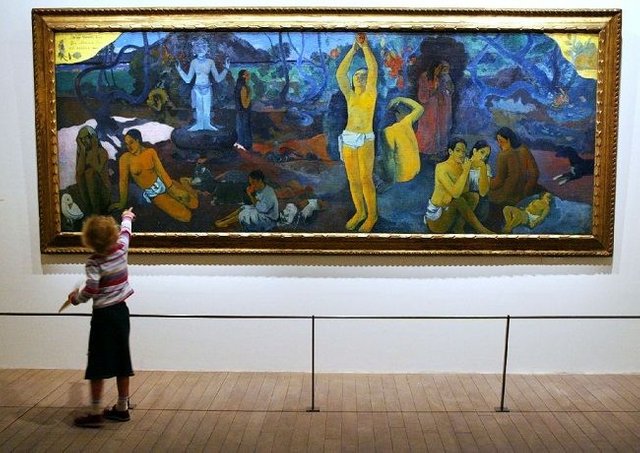Paul Gauguin - Where Do We Come From? What Are We? Wherе Are We Going?

The great Paul Gauguin discovered his passion for drawing late - about 35 years. Then he first caught a brush and a canvas. He cut off his bourgeois existence and the prestigious profession of the Exchange, which brings him a lot of money, and devoted himself to his passion - the painting, which makes him miserable, along with his whole family. Not long after, he realizes the dream of his friend Van Gogh and goes to live in Tahiti - in search of an unbounded conditional world. Seeking absolute freedom, joining the tribes of the island, following wild customs and beliefs make the former bourgeois a whole new person. On the island of Gauguin there is almost constant inspiration and there he draws his best paintings. Gauguin leads an extremely infamous, controversial and interesting life. He walks around the world, wandering in search of happiness. At age 46, in 1894, Gauguin finally decided to settle in Tahiti, clearly realizing that he was in the final stage of his long journey around the world and at the end of his life.
Gauguin Van Gogh Painting Sunflowers, by Paul Gauguin 1888
Like many late 90th century artists, he engulfs Eastern mysticism and seek inspiration in other cultures. He wanted to escape European civilization and "everything artificial and conventional". So he has suddenly returned to his native France for a short time. In 1895, after a heavy journey lasting about 60 days, Paul Gauguin's exhausted psychic and physical arrived in Papeete. Gauguin has a broken bone, struggles with marsh fever, hunger, the consequences of alcoholism. He spends most of his time in hospital. But the artist gains power inspired by his new love, the 14-year-old Paura, who comforted him and posed for his paintings, like his previous partners. When in 1885 Paul Gauguin returned to Paris, he was a man with nothing. He has abandoned, as some say, his family in Copenhagen. There is also his collection of paintings and art objects gathered earlier when his money flows from everywhere. There is no more money at this point. There is no education of an artist, but there is a great talent and desire. One year Gauguin works and draws little, so at the last Impressionist exhibition in 1886 he shows more old things. There is also a break with the Impressionists, whose leader is now George Sora. Gauguin can’t tolerate his pohantilism, a neo-impressionist painting technique based on a combination of points that make up the artistic image. In the summer, Gauguin goes to Pont Aven, an artistic colony in Brittany where two important things happen.

Sacred Spring: Sweet Dreams (Nave nave moe)
First, he became popular with a group of young artists, both because of his release, his skills in boxing and fencing, and his paintings. Secondly, he begins to find his own way in art, already outside of Impressionism. For him, the return to traditional European art is unthinkable, he finds it too imitative, in the sense that it too much imitates reality and lacks the depth given by the symbols. On the contrary, it is valid for the more exotic European art of Africa and Asia. In the first place, Gauguin is attracted to Japanese fashion and returns to some European medieval techniques that lead him to a synthetic approach to what critics call post-impressionism. One of the truly astonishing works that Gauguin leaves us from this period is the "Yellow Christ," an image of a crucifix in which the body of Christ is yellow and flat, almost two-dimensional, naively separated from the surrounding world with a thick contour. Somehow it sounds like it really will save the Savior.

Arearea no varua ino (The Amusement of the Evil Spirit), 1894
At the end of 1896, Pauura gave birth to her first child, who died shortly thereafter. On April 19, 1898, his son Emil was born. In 1897, Gauguin faces a new series of misfortunes, one of which is the death of his daughter-in-law, Alain, the tuberculosis. Nevertheless, in the same year he created his famous painting Vairumati. In addition to stress, his broken bone is so inflamed that he is unable to move on his own. Blinded due to conjunctivitis, which further depresses him and forces him to make a creative break that lasts nearly half a year. After a few heartbeats, Gauguin began to think of suicide as a possible outcome, loneliness, and didn’t contact the natives, and for one month he painted one of his most significant paintings: "Where Do We Come From? What Are We? Wherе Are We Going?" Soon after he is ready with the painting, Gauguin decides to put an end to his troubles by drinking arsenic, but he vomits, and that saves him. Instead of dedicating himself to art again, he took a post at the Social Affairs Office in Papeete, while at the same time he was a political journalist. At the end of his life, Gauguin is again looking for a new beginning. But he entered into a severe conflict with the Catholic bishop for his life, for which in 1903 he received a fine of 500 francs and three months in prison. The artist died of syphilis on May 8, 1903, and was buried in Hiva Oa on the Marquis, French Polynesia.

Where Do We Come From? What Are We? Wherе Are We Going?
Gauguin's famous painting is painted on Tahiti Island, which has become a creative refuge for the artist after his escape from Paris. Where Do We Come From? What Are We? Wherе Are We Going?" It contains the answers to the biggest questions in human life, a philosophical, deep, spiritual-like covenant, after this painting Gauguin feels empty and exhausted. He is able to create a drawing similar to this and reaches the poison, but his destiny is set to live for another five years. Today the painting "Where Do We Come From? What Are We? Wherе Are We Going?" is the Boston Fine Arts Museum. Which are the 15 symbols depicted in Gauguin's famous painting, which the artist himself advises to read from right to left, like a cabalist text.
The sleeping child is the soul before her earthly reincarnation. Gauguin believed that before our birth, we were in childhood bliss in the heavens.
The dog portrays the misfortunes that lurk us on the ground.
The three women portray the first stage of physical body staying before we go on a journey of self-knowledge.
The tearing-off man is a symbol of the pursuit of knowing the secrets of peace.
The figure with a hand on the head represents the second stage on the path to knowledge-a man has fallen into despair from the inability to find answers to the questions of being.
The two figures in red - the time when we begin to analyze, to talk.
The bird is an Egyptian symbol of the spiritual path.
The woman in black symbolizes the soul at its upper stage of development. Surviving sufferings help us to understand the meaning of existence.
The spring is a symbol of eternity.
The Statue of Godhead presents the hope of the Resurrection.
The child symbolizes the birth of the soul in those who have not yet found the quest for self-knowledge.
Goat, cat and dog are symbols of carefree life in the material world.
The naked figure depicts the sensual as a life mission for those who live in the material world.
The old woman symbolizes the doom of the body.
The white bird, with prey in the nails, is the inevitable death.
Godflesh,
Like your post. I like when people question life....where we come from? what are we doing here and where we going? My take is if we do not know where we come from we will never know the rest.
You said “desire to know myself” – I applaud you, like your honesty.
Thank you very much. So you make movies? :)
We have the same passion :) I am screenwriter with many script, but still not with official movie :D
Yes, when I can, I write and then film. So much fun when your character says what you want to say. Filming is expensive.....and the “mainstream” does not really care about quality, they promote wars and destruction. It is always good to exchange ideas and give feedback that helps, please feel free if you want feedback on your scrip and hope i can reach out to you as well
this reminded me of that Fargo 3 character... cheif's step dad...
anyways nice post...
upvoted and followed...!!!
I watch it only to the 2 season :D But prefer the original Coen's movie :)
Thank you :)
Where does your interesst in all these famous persons and works come from? it's nice to see the effort you put in your storys and the outcome that is so interessting! keep up the good work, you got a new follower!
maybe you are interessted in the posts about product design and my arts that are about to come. If so i would be happy with a follow back :)
Well I have really huge passion to art. Of all spiritual domains, I prefer literature and philosophy, but I don't want to confine myself only to them. This come from the desire to know myself but still without success :D
I fallow you too and will waiting to see your arts :)
Well done. I wish I knew more about Gauguin sooner. He led an inspiring life for an artist. When will you cover Kierkegaard and Rilke?
Kierkegaard soon :) Before week I have write something about Rilke if you want you can check the article:
https://steemit.com/story/@godflesh/rainer-maria-rilke-duino-elegies-to-be-someone-else-s-dream
Nice one! Thanks for the info
You are welcome :)
Great post! You cherish quality over quantity and that could only bring you to success. Regarding Paul Gauguin, I am not a huge fan of synthetism myself, but it is always a pleasure to read an interesting story, especially this one. His life was actually full of set backs. Have a nice day, and more successful posts!
Thank you very much. Cheers! :)
Gauguin is one of my all time favourites, nice article about him, I'm happy to have learned some new things. I look forward to more of your articles and will be following.
I'm a French born artist living on an island (Curaçao) as well. I'd like to share on of my works with you...
Thank you. I followed you too :)
Very good work!
Merci beaucoup 🙏🏽
Nice friend
Thanks :)
good art
Yes :)
Thank you for the story of a bright artist! Subscribed)
thank you :)
This post has received gratitude of 8.36 % from @appreciator thanks to: @godflesh.